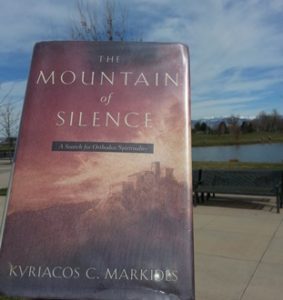 Born into an Eastern Orthodox family on Cyprus, Kyriacos C. Markides adopted an agnostic view of God and spirituality in the 1970’s while at college in the USA. After years of scientific materialism, he begin a journey that took him through Hindu spirituality and transcendental meditation before returning to Eastern Orthodoxy.
Born into an Eastern Orthodox family on Cyprus, Kyriacos C. Markides adopted an agnostic view of God and spirituality in the 1970’s while at college in the USA. After years of scientific materialism, he begin a journey that took him through Hindu spirituality and transcendental meditation before returning to Eastern Orthodoxy.
Being a professor of sociology (University of Maine), Markides documented and published various segments of his spiritual journey including his chats with various healers and mystics on the edges of Eastern Orthodoxy. The focus on this book, The Mountain of Silence: A Search for Orthodox Spirituality, is Markides discovery of Eastern Orthodox spirituality as seen through a monastic lens.
The book starts off with Markides seeking to visit the monks living on Mount Athos in Greece. Christian monks and hermits have lived on this mountain for over 1,800 years with the single focus of pursuing God. The importance of this mountain in Eastern Orthodoxy can be seen through the nickname the “Holy Mountain.”
Sadly, Markides was unable to visit Mount Athos at the beginning of the book. Rather his journey took him back to Cyprus where a former monk of the mountain recently became the abbot of a monastery. Throughout the rest of the book, Markides and his monastic guide, Father Maximos, constantly refer back to Mount Athos and the traditions of the mountain. The book ends with Markides finally reaching Mount Athos only to find that the monks had taken a vow of silence during the time period he had chosen to visit. Hence the name of the book.
The concepts recorded within the pages of the book were fascinating to me. There were times when I put down the book thinking that I was reading a book on Pentecostalism, only with more monks. At other times, however, could see bits of Markides’ transcendental meditation background slipping in through various words and concept. At still other points within the books I could see Eastern Orthodoxy at its finest.
While I gleaned many a new concept from the book, the thing I want to focus on here is the Pentecostal fare of the book. By this I mean, throughout the book Markides would talk about the various signs and wonders the monastic monks would perform. Everything from healing a person in front of them to the healing of someone at a distance to prophecy to words of knowledge. The charismatic gifts of 1 Corinthians 12 were in full view throughout the book.
There was one primary difference, however, in how the Eastern Orthodoxy monks and Pentecostalism in general saw the gifts. Namely, the monks saw the gifts as coming about after years of seeking God and denying one own desires. Pentecostalism and the Charismatic movements that followed (including the Vineyard) tend to teach that anyone can experience the charismatic gifts at any point in their Christian walk. As in, a new Jesus follower in the Pentecostal/Charismatic tradition would be taught that they could pray for the sick and see folks healed whereas in the monastic tradition of Eastern Orthodoxy it would be elders and lifelong monks who would see that type of stuff.
While I clearly lead towards the former view (as noted in my book The Here and Not Yet), I have to wonder if the monastic view doesn’t have something to offer us. A common danger within Pentecostal and Charismatic circles is that a person who is used by God becomes prideful and goes off the rails. The gifts in effect become more important than the character of the people doing the stuff. By denying themselves and waiting on God for years, the elders within the monastic tradition tend to have a better grasp on the character portion while also operating in the gifts of the Spirit. So I guess you can say that they place a greater emphasis on the character of a person rather than that persons gifting.
And that, I believe, is something we in the Pentecostal/Charismatic tradition need to learn. Gifting, while cool, isn’t as important as character. We need to create a culture and teaches people to focused on spiritual formation and character development while at the same time pursuing the works of the King (i.e. signs and wonders). As the Apostle Paul told us long ago, the gifts will stop but love (i.e. character) will continue long after this age ends (1 Corinthians 13).

 The writing bug has hit me hard this week… so I took yesterday off work and spent the morning at a local coffee shop writing.
The writing bug has hit me hard this week… so I took yesterday off work and spent the morning at a local coffee shop writing.